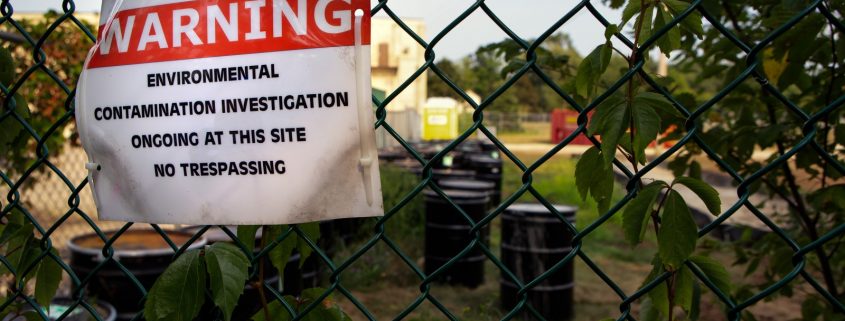Whitmer orders Michigan to set PFAS standards, setting up clash with GOP

Chemicals known as PFAS are befouling sites throughout Michigan, but there’s no consensus on how much of the chemical is unsafe for groundwater. Photo © J. Carl Ganter/Circle of Blue
By Jim Malewitz, Bridge Magazine
LANSING — Gov. Gretchen Whitmer has kickstarted efforts to set a statewide standard for PFAS, hazardous chemicals that are increasingly befouling Michigan waters.
The Democrat on Tuesday directed the Department of Environmental Quality to begin the process of establishing a drinking water standard for how much of the chemicals are unsafe. Whitmer ordered a state group, the PFAS Response Team, to convene a scientific workgroup to review other health-based drinking water standards for the chemicals.
“All Michiganders deserve to know that we are prioritizing their health and are working every day to protect the water that is coming out of their taps,” Whitmer said in a statement Tuesday. “As a result, Michigan will begin the process to establish PFAS drinking water standards that protect public health and the environment.”
Whitmer indicated the process would be accelerated and ready for public comment by Oct 1. Some Republicans and industry groups, however, are already signaling objections, saying Michigan should defer to federal regulators.
Like most states and the federal government, Michigan lacks a standard for PFAS, which is shorthand for per- and polyfluoroalkyl substances that were used in a variety of household and industrial products. Without a standard, Michigan regulators lack leverage to force water systems to address contamination.
The DEQ this year found PFAS at various levels in 119 of the state’s 1,114 public water systems, as part of a $1.7 million sampling effort.
Used in products including Teflon and Scotchgard, PFAS is linked to low birth weights, immune system troubles, thyroid problems and cancer. It was used extensively on military bases in firefighting foam, and a growing number of veterans fear exposure caused health problems.
“I commend Gov. Whitmer for directing swift action to protect our drinking water, our children and our families,” said Anthony Spaniola, a Troy attorney who has become an advocate for Michiganders affected by PFAS.
“As other states like Vermont and New Jersey are implementing health-based PFAS standards, Michigan must move to the forefront on this critically important issue. The science has clearly shown that PFAS chemicals pose serious threats to the most vulnerable among us, particularly pregnant women and children.”
Whitmer’s move comes as some Republican leaders have expressed skepticism the state has enough information to establish a PFAS standard.
“It is not clear to me that we’ve created a situation where we know what to do with that level,” Senate Majority Leader Mike Shirkey told reporters in February. “And that’s what I mean about we need to increase our wisdom before we make any decisions.”
On Tuesday, Shirkey issued a statement that lauded the state’s previous actions on PFAS and added that it’s “imperative that governments rely on scientific research and facts to establish standards for drinking water.”
“The governor’s proposed rule will be vetted and scrutinized by the Senate and will be subject to the regular rule-making process,” Shirkey said.
In the House, Rep. Gary Howell, R-North Branch and chairman of the Natural Resources Committee, told Bridge this month that setting a drinking water standard for PFAS is one of his top issues, and he awaits direction from Whitmer.
Whitmer’s move also drew concern from the Michigan Chemistry Council trade group, which issued a statement saying her decision “leaves many questions unanswered.”
The group’s executive director, John Dulmes, noted the vast majority of state water systems tested negative for any traces of the chemicals.
“We believe the EPA and other federal agencies are ultimately best-positioned to develop such rules, and have reinforced their commitment to do so,” Dulmes said in a statement.
“For that reason, we urge the Whitmer administration to ensure that science – not politics – is at the front and center of this proposed process.”
Different standards
In the absence of a statewide standard, Michigan regulators generally have referred to an advisory from the U.S. EPA of 70 parts per trillion for combined levels of PFOS and PFOA, two more well-understood types of PFAS. (One part per trillion is akin to a grain of sand in a swimming pool.)
In June, however, another federal agency offered different guidance.
A report from the Agency for Toxic Substances and Disease Registry, part of the Centers for Disease Control, produced a “minimal risk level” far below the EPA threshold: 7 parts per trillion for PFOS and 11 parts per trillion for PFOA.
A few states have come up with their own numbers. For PFOA, that ranges from 14 parts per trillion in New Jersey to 35 parts per trillion in Minnesota. Vermont, meanwhile, has a standard of 20 parts per trillion for five different PFAS chemicals.
In Michigan, state Rep. Winnie Brinks, D-Grand Rapids, introduced stalled legislation the past two years drinking water standard for PFAS at 5 parts per trillion, lower than any other state.
Rising costs for water systems
Setting a drinking water standard is a multi-million dollar proposition that would force contaminated systems to install special filtration systems or switch to cleaner water sources.
In a 2017 proposal, New Jersey estimated public drinking water systems would pay about $2,000 for quarterly testing in the first year.
And prices for a “granular activated carbon” system that could filter out PFAS ranged from $500,000 to $1 million, according to New Jersey’s Drinking Water Quality Institute, a state research panel.
Keith Cooper, chairman of the institute and a Rutgers University professor, told Bridge last year that New Jersey minimized disruption among utilities by phasing in its standards.
“A lot of the water purveyors knew this was coming already,” he said.
Some Michigan water providers have already taken action on PFAS. A report this month by MLive detailed millions in PFAS-related spending by local governments — from Ann Arbor to Grayling — to extend new water lines, upgrade filtration systems, buy bottled water and hire legal help.
No-stricter-than federal?
Left uncertain is whether Whitmer will face roadblocks from a new state law discouraging regulations stricter than those of the federal government.
“That’s something that we have to be mindful of and figure out how to navigate,” Whitmer told reporters Tuesday.
In last year’s lame duck session, Michigan Republicans narrowly passed a law barring agencies from crafting rules tougher than Washington’s unless they show a “clear and convincing” need due to “exceptional circumstances.”
Republicans said the measure would bolster transparency by requiring agencies to more clearly explain the need for new regulations. Democrats and environmentalists called the “clear and convincing” standard a high bar to meet in court, saying the law makes agencies more vulnerable to litigation.
Bill sponsor Rep. Triston Cole, R-Mancelona, said it would not affect PFAS rulemaking or other regulations where no federal standards exist. But Nick Occhipinti, government affairs director for the Michigan League of Conservation Voters, is among critics who say there’s no way to know for sure — until the dispute ends up in court because the law’s language is so broad.
A group of Democrats last week introduced longshot legislation to repeal the no-stricter-than-federal standard.
“A single federal standard does not meet our needs,” Rep. Donna Lasinski, D-Scio Township, said last week while unveiling the repeal bill.
Bridge reporter Lindsay VanHulle contributed to this report.
Jim Malewitz reports on the environment for Bridge. Based in Lansing, but with plans to scour both peninsulas, he is looking for stories about how public policy, climate change and other phenomena affect the state’s trove of natural resources – all while leaders tout the “Pure Michigan” brand.












Leave a Reply
Want to join the discussion?Feel free to contribute!